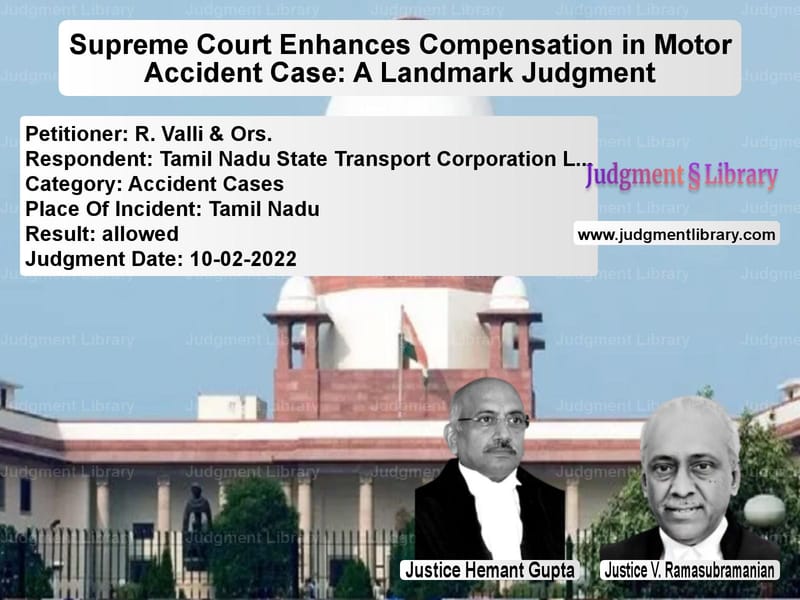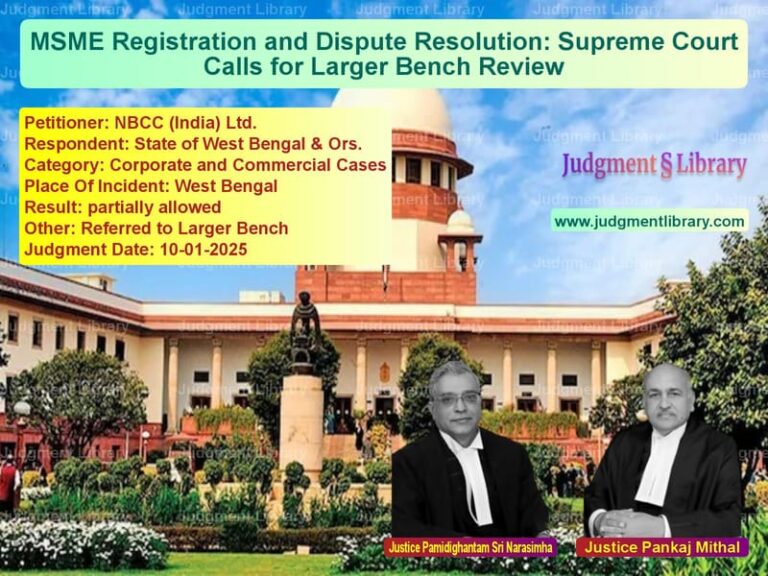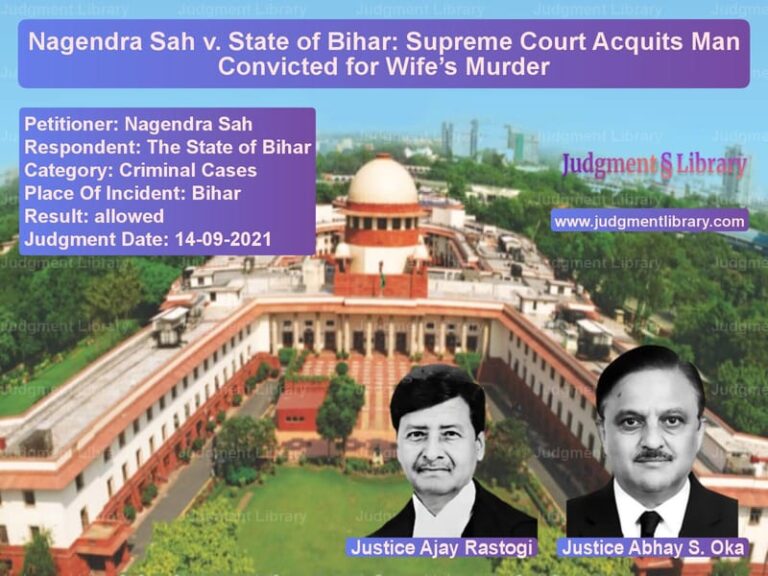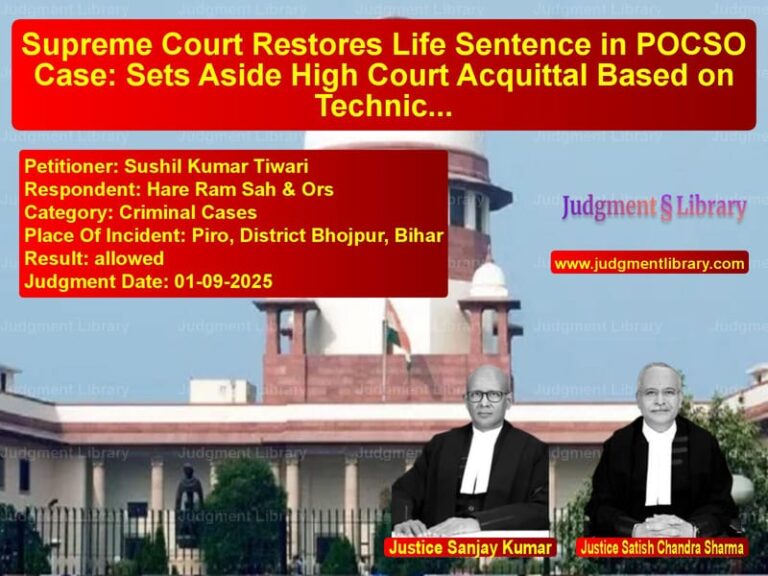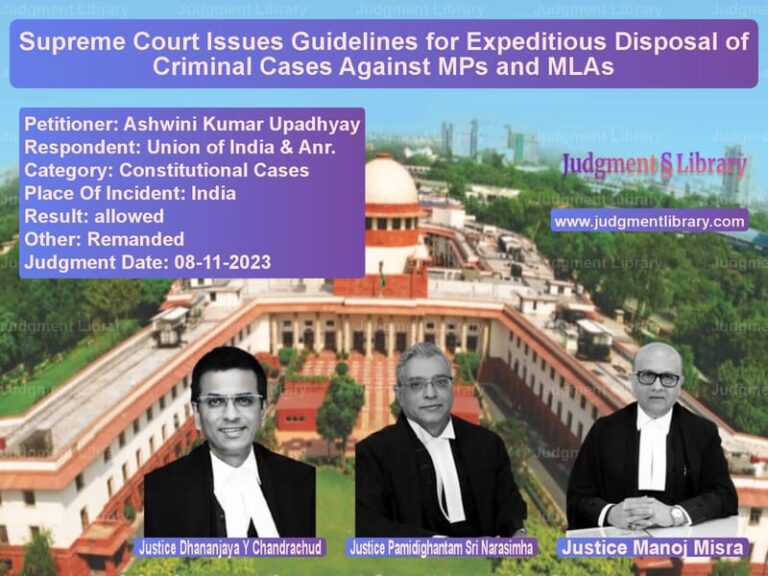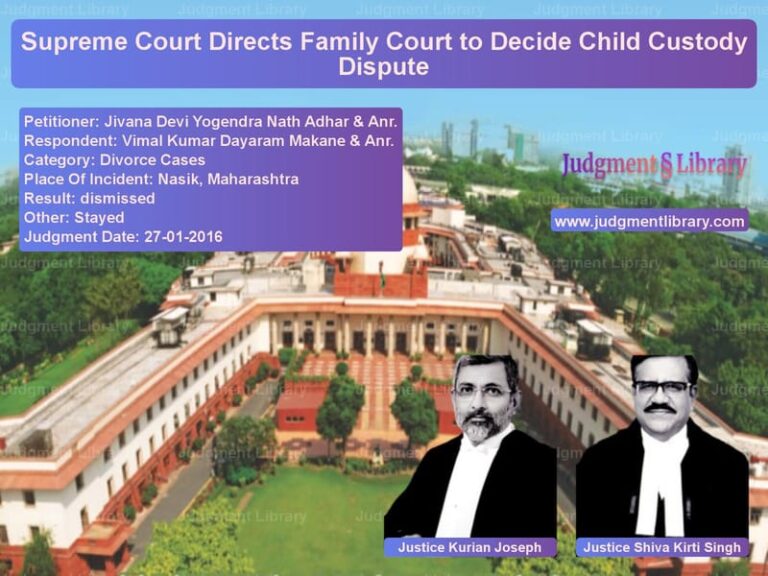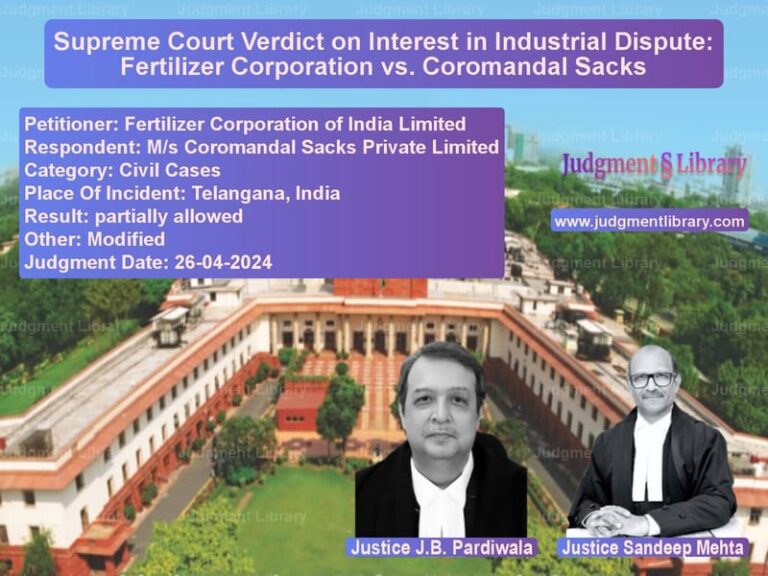Supreme Court Enhances Compensation in Motor Accident Case: A Landmark Judgment
The case of R. Valli & Ors. vs. Tamil Nadu State Transport Corporation Ltd. revolves around a tragic motor accident that claimed the life of V. Rajasekaran on February 22, 2011. The deceased’s legal heirs filed for compensation, and while the Motor Accident Claims Tribunal and the High Court granted certain amounts, the appellants sought a higher compensation, challenging the methodology used by the lower courts.
This case raised critical questions regarding the appropriate method for calculating compensation, including whether a split multiplier approach based on the deceased’s pre- and post-retirement years was justified or whether the multiplier should be applied based solely on the deceased’s age at the time of death. The Supreme Court’s verdict provided clarity on these issues, setting an important precedent.
Background of the Case
On February 22, 2011, V. Rajasekaran was riding his two-wheeler when a bus belonging to the Tamil Nadu State Transport Corporation collided with his vehicle. The impact of the accident caused severe head injuries, leading to his instant death. He was 54 years old at the time. The deceased was employed at M/s Areva T & D India Limited and had a salary of Rs. 23,062.30 per month.
The legal heirs of the deceased approached the Motor Accident Claims Tribunal in Chennai, which awarded them a compensation of Rs. 13,82,628/-, considering the income and the remaining years of service of the deceased. The Tribunal held that the accident was a result of the rash and negligent driving of the bus driver.
Findings of the High Court
The claimants, dissatisfied with the compensation awarded, challenged the decision before the Madras High Court. The High Court affirmed the Tribunal’s findings on liability but revised the compensation amount, enhancing it to Rs. 15,12,628/-. The High Court applied a split multiplier methodology, considering:
- A multiplier of 3 for the remaining years of service (until superannuation at 58 years).
- A multiplier of 8 for post-retirement years, assuming a dependency period of 10 years.
Petitioners’ Arguments Before the Supreme Court
The appellants argued that the split multiplier methodology adopted by the High Court was erroneous. They contended that the Supreme Court had already settled this issue in previous judgments, particularly in:
- Sarla Verma v. Delhi Transport Corporation
- Reshma Kumari v. Madan Mohan
- National Insurance Co. Ltd. v. Pranay Sethi
The petitioners contended that:
- The multiplier should be chosen based on the age of the deceased at the time of death, not the remaining years of service.
- Future prospects must be considered while computing the final compensation.
- Applying different multipliers for pre- and post-retirement years goes against established legal principles.
Respondents’ Arguments
The Tamil Nadu State Transport Corporation, representing the respondent, defended the High Court’s decision, arguing that:
- Using different multipliers for pre- and post-retirement periods was a justified approach.
- The split multiplier method was supported by various High Court rulings.
- The compensation amount awarded was fair and should not be disturbed.
Supreme Court’s Analysis and Ruling
The Supreme Court found the High Court’s approach flawed. Referring to its landmark judgment in Pranay Sethi, the Court reiterated that:
“The age of the deceased should be the sole determinant for choosing the multiplier, and any deviation from this rule is legally unsustainable.”
The Court emphasized that the multiplier must be applied uniformly based on the deceased’s age at the time of death. It stated:
“Since the deceased was 54 years of age at the time of the accident, the correct multiplier to be applied is 11, as established in Sarla Verma and Pranay Sethi.”
Accordingly, the Court recalculated the compensation as follows:
| Component | Amount |
|---|---|
| Monthly Dependency | Rs. 20,756/- |
| Future Prospects (15%) | Rs. 3,113/- |
| 1/4th Deduction for Personal Expenses | Rs. 5,967/- |
| Total Monthly Dependency | Rs. 17,902/- |
| Multiplier (11) | Rs. 23,63,064/- |
| Loss of Estate | Rs. 15,000/- |
| Funeral Expenses | Rs. 15,000/- |
| Consortium | Rs. 40,000/- |
| Total Compensation | Rs. 24,33,064/- |
The Court also ruled that interest should be awarded at 9% per annum from the date of filing the claim application until realization.
Impact of the Judgment
This judgment reaffirms the established legal principle that the multiplier should be chosen based solely on the age of the deceased and not on the remaining years of service. It eliminates inconsistencies in compensation calculations, ensuring a uniform approach.
For claimants in motor accident cases, this ruling provides clarity and ensures that compensation is computed in a fair and standardized manner. It prevents the arbitrary use of multiple multipliers, which could otherwise reduce rightful compensation.
Conclusion
The Supreme Court’s decision in this case has far-reaching implications for motor accident compensation claims. It reinforces the necessity of following well-established legal precedents and prevents misinterpretations that could negatively impact claimants.
By adhering strictly to the principles laid out in Sarla Verma and Pranay Sethi, the Court has ensured that compensation calculations remain fair, predictable, and legally sound.
This landmark ruling will serve as a crucial reference point for future motor accident cases, upholding the rights of claimants and promoting a consistent approach in determining just compensation.
Petitioner Name: R. Valli & Ors..Respondent Name: Tamil Nadu State Transport Corporation Ltd..Judgment By: Justice Hemant Gupta, Justice V. Ramasubramanian.Place Of Incident: Tamil Nadu.Judgment Date: 10-02-2022.
Don’t miss out on the full details! Download the complete judgment in PDF format below and gain valuable insights instantly!
Download Judgment: r.-valli-&-ors.-vs-tamil-nadu-state-tra-supreme-court-of-india-judgment-dated-10-02-2022.pdf
Directly Download Judgment: Directly download this Judgment
See all petitions in Road Accident Cases
See all petitions in Compensation Disputes
See all petitions in Motor Vehicle Act
See all petitions in Negligence Claims
See all petitions in Judgment by Hemant Gupta
See all petitions in Judgment by V. Ramasubramanian
See all petitions in allowed
See all petitions in supreme court of India judgments February 2022
See all petitions in 2022 judgments
See all posts in Accident Cases Category
See all allowed petitions in Accident Cases Category
See all Dismissed petitions in Accident Cases Category
See all partially allowed petitions in Accident Cases Category

